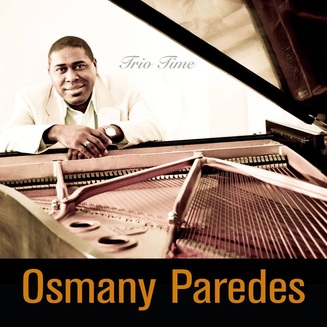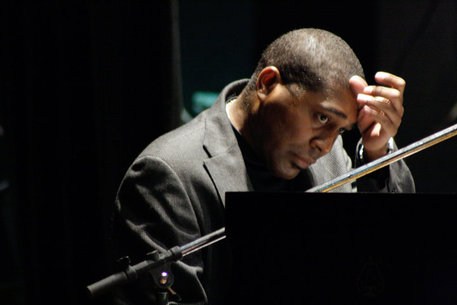
He is Cuban-born and began his musical education at the age of five--taught by his father Guillermo Paredes. Guillermo schooled his son early on about Afro-Cuban rhythms. At eight years of age, Osmany began his formal education in classical piano.
He graduated with honors from the renowned National School of Music in Havana in 1991.It was playing with the charanga group Orquesta America, the jazz group of Bobby Carcasses and later the charanga group Orquesta Enrique Jorrin that really gave him his education in Cuban music, jazz and performance.
Osmany moved to Mexico in 1992, playing with various artists and groups in many Jazz festivals throughout Latin America and Europe. In January of 1998, he recorded his first Latin Jazz CD in Mexico entitled "Osmany Paredes con Menduvia.” He moved to the United States in 2003 and now lives in New York City.
In March of 2013, Osmany recorded his first trio album at Sala De Audio in Mexico City. This album is entitled “Trio Time.” Osmany on piano is joined by Jorge Molina on bass and Giovanni Figueroa on drums. Seven out of the nine tracks are composed by Osmany himself.
| | |
“Crossing La Alameda” showcases the emerging trio and they are in sweet unison. Molina’s solo is understated and elegant. Figueroa’s short drum solo is a glimpse of things to come and creates an expectation for more.
The third track is entitled a “Simple Waltz for My Son.” It is a charming melody. The rhythm section creates a sturdy baseline for Osmany’s excursions. That capticvating melody is developed sweetly and emotionally. Easily the most emotional piece on the recording. The coda winds down until you hear Osmany’s son calling out to him. Like I said--charming.
A cool Jazz vamp on top of impressionistic chords, “Improv 2013” is proof that Osmany cannot give up cold turkey on solo piano. This is a quick Jazz venture that rapidly enthralls the listener.

Osmany takes Saumell’s piece and recreates the classical composition into a Jazz juggernaut. The rhythm of the danzon is faithfully rendered by Giovanni Figueroa. A good suggestion is to hear the track and focus on the rhythm section first, then hear it again with the melody on top.
The sixth track is “A Song.” The title can’t be much more minimalistic but the piece itself is anything but minimalistic. Molina and Figueroa swing like they mean it, and turn in some of their best work on the album right here.
Molina lays down a melodic bass solo that is lyrical and not all punch and run. While not really soloing on this piece, Figueroa delivers what has been expected and he gives with both hands.
Perhaps the most engaging, endearing and enthralling piece is “Boston Nights.” It is almost Gershwinesque in its elegance and beauty. It is the longest track on the album and it should be. The hot rhythm section lays low for this piece and this truly serves to elevate the loveliness of the melody above all.
Molina’s bass solo does not betray the fragile beauty of the melody. He takes a sideroad, to be sure, but it is only to allow a sidelong glance at the melody that returns with Osmany’s piano. It is a sweet melancholy.
“Winds of L.A.” has Molina and Figueroa holding down an extraordinary groove and keep holding it even after Osmany’s piano joins in. The piano is almost the servant of the rhythm section in this piece. The listener’s attention is constantly pulled to the bass and drums. The piano is quick and engaging but it works its own magic below the surface of the groove. Cool syncopated moments highlight the end of the piece.
The album ends with a dual composition by Sindo Garay and Manuel Corona. These two were both trova artists and rivals. Taking a composition from each of them, Osmany combines them into a dialogue.
The trova style began in Santiago, Cuba and was characterized by singing one’s own compositions, accompanying themselves on guitar and treating the piece poetically. Osmany certainly does the last of those three, treating these forebears of Cuban music with great poetry and praise. The music that was produced by rivals has been diplomatically woven together to create a harmonious unity of opposites.
Osmany himself has created an album of the most genuine and emotional charm and beauty. This album does not move one to tears; it is not that kind of emotion, even in its most melancholy moment. Rather, it moves the listener to smile a smile of satisfaction.
"Trio Time" can be purchased here: http://www.cdbaby.com/cd/osmanyparedes
 RSS Feed
RSS Feed
